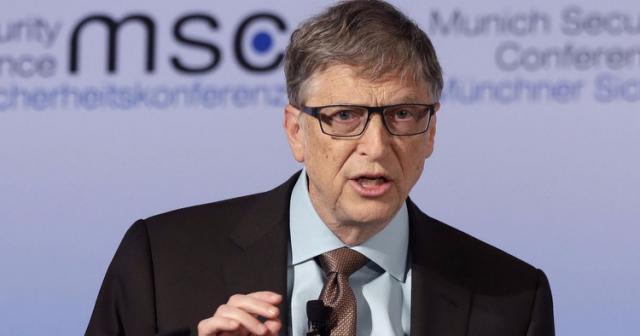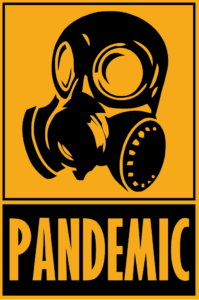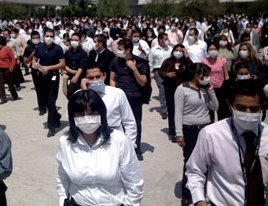Gates Speech at Security Conference Focuses on World Not Being Prepared for a Pandemic : A Well Thought Out Scream by James Riordan

I met Bill Gates once and had a very nice conversation with him. Over the years I have noted how he, with the help of his wife Melinda, has become far more than just the world’s richest man – he has become a caring and concerned citizen who uses his wealth and prestige to try to make the world a better place. So, recently when he spoke at the Munich Security Conference in Germany about the possibility of a pandemic in the next ten to fifteen years, I paid attention.
 A pandemic is one of the world’s top three threats, and if not prepared for, could wipe out 30 million people in less than a year, philanthropist Bill Gates says. Microsoft’s co-founder said at the Munich Security Conference in Germany Saturday that we’re due for an apocalyptic sickness on the scale of the 1918 flu, which killed some 50 million people. The global crisis could strike in the next 10-15 years if we’re not careful, Gates warned. Bioterrorism has become feasible enough, he said, that a genetic engineer could use computers to create a synthetic airborne pathogen capable of wiping out a fraction of the world’s population quickly. “The next epidemic could originate on the computer screen of a terrorist intent on using genetic engineering to create a synthetic version of the smallpox virus,” he said, “or a super contagious and deadly strain of the flu.” But even if terrorists aren’t to blame, nature is likely to take its course. “Whether it occurs by a quirk of nature or at the hand of a terrorist, epidemiologists say a fast-moving airborne pathogen could kill more than 30 million people in less than a year,” Gates said. “And they say there is a reasonable probability the world will experience such an outbreak in the next 10 to 15 years.”
A pandemic is one of the world’s top three threats, and if not prepared for, could wipe out 30 million people in less than a year, philanthropist Bill Gates says. Microsoft’s co-founder said at the Munich Security Conference in Germany Saturday that we’re due for an apocalyptic sickness on the scale of the 1918 flu, which killed some 50 million people. The global crisis could strike in the next 10-15 years if we’re not careful, Gates warned. Bioterrorism has become feasible enough, he said, that a genetic engineer could use computers to create a synthetic airborne pathogen capable of wiping out a fraction of the world’s population quickly. “The next epidemic could originate on the computer screen of a terrorist intent on using genetic engineering to create a synthetic version of the smallpox virus,” he said, “or a super contagious and deadly strain of the flu.” But even if terrorists aren’t to blame, nature is likely to take its course. “Whether it occurs by a quirk of nature or at the hand of a terrorist, epidemiologists say a fast-moving airborne pathogen could kill more than 30 million people in less than a year,” Gates said. “And they say there is a reasonable probability the world will experience such an outbreak in the next 10 to 15 years.”
Gates, who has been working to improve global health for 20 years, has long warned of such an outbreak, but the bio-terrorism angle appears to have sped up the “Doomsday Clock,” a symbolic warning of the likelihood of a global catastrophe. Fears over pandemic have risen recently, as the World Health Organization reported in January that a new avian flu outbreak that was first detected late last year has affected at least 40 countries. Other strains of the virus have affected millions dating back to 2013. Gates pointed out that while we are currently underprepared for a global pandemic, we do have the technology to work on vaccines and other drugs. We just need the investment. “I view the threat of deadly pandemics right up there with nuclear war and climate change. Innovation, cooperation, and careful planning can dramatically mitigate the risks presented by each of these threats,” Gates said. “I’m optimistic that a decade from now, we can be much better prepared for a lethal epidemic—if we’re willing to put a fraction of what we spend on defense budgets and new weapons systems into epidemic readiness.”
 It is important to note that this speech was at a security conference and not a health meeting. Gates could have focused on some other issue such as nuclear weapons or climate change, but he chose to focus on infectious disease threats (whether starting naturally or used as a bio-terrorist weapon) for good reason. Our society is in need of a good wake up call and slap in the face. In the 21st century, pandemics are rare but not unheard of. The H1N1 influenza pandemic of 2009 was said to have run its course by the World Health Organisation in 2010, and Gates argued there’s no room for complacency. Planning systems of diagnosis as well as rapid vaccine development could help prevent a naturally occurring infectious disease from spreading, as well as one maliciously unleashed. “It’s hard to get your mind around a catastrophe of that scale, but it happened not that long ago. In 1918, a particularly virulent and deadly strain of flu killed between 50 million and 100 million people,” he said. “We would be wise to consider the social and economic turmoil that might ensue if something like ebola made its way into urban centres.”
It is important to note that this speech was at a security conference and not a health meeting. Gates could have focused on some other issue such as nuclear weapons or climate change, but he chose to focus on infectious disease threats (whether starting naturally or used as a bio-terrorist weapon) for good reason. Our society is in need of a good wake up call and slap in the face. In the 21st century, pandemics are rare but not unheard of. The H1N1 influenza pandemic of 2009 was said to have run its course by the World Health Organisation in 2010, and Gates argued there’s no room for complacency. Planning systems of diagnosis as well as rapid vaccine development could help prevent a naturally occurring infectious disease from spreading, as well as one maliciously unleashed. “It’s hard to get your mind around a catastrophe of that scale, but it happened not that long ago. In 1918, a particularly virulent and deadly strain of flu killed between 50 million and 100 million people,” he said. “We would be wise to consider the social and economic turmoil that might ensue if something like ebola made its way into urban centres.”
Issues of bio-terrorism and global pandemics have captured Gates’ attention for awhile now. He also raised the spectre in January at the World Economic Forum in Davos, Switzerland, urging governments to begin investing in prevention. In the midst of the Ebola outbreak in West Africa in 2015, the Bill & Melinda Gates Foundation warned the world isn’t ready to fight a highly infectious disease: “In fact, of all the things that could kill more than 10 million people around the world in the years ahead, by far the most likely is an epidemic, from either natural causes or bioterrorism.”
 Many thought that the Ebola outbreak would spur people to more action. Well, it did result in a new version of the song “Do They Know It’s Christmas?” but, not a whole lot more.. The 2014-2016 Ebola outbreaks in West Africa involved a virus that killed around half the people it infected. Seemingly suddenly, Ebola jumped into the headlines (even though it had been around for years) when the number of cases in Liberia, Sierra Leone, and Guinea surged, raising concerns that the pathogen may spread elsewhere, including the U.S. Suddenly, people were saying, “quick, we need a vaccine” without giving the world much lead time to deliver and prepare accordingly as stated in our Lancet piece. I recall during the Paul G Allen Family Foundation Ebola Innovation Summit seeing many people around the room who had not even heard of Ebola a year prior, saying that we needed to eliminate this disease, naively underestimating the effort required to do so. As I tried to explain to a founder of a major dot.com at the meeting, creating a successful website is not the same as combating an infectious disease. Fortunately for the rest of the world, the Ebola epidemic eventually subsided without any vaccines or new technologies. The billionaire philanthropist is also putting his (foundation’s) money where his mouth is. The Gates Foundation, which funds research into infections such as Malaria, has also invested in the Coalition for Epidemic Preparedness Innovations (CEPI). The group aims to develop quick, affordable vaccine responses to epidemics such as Ebola and SARS.
Many thought that the Ebola outbreak would spur people to more action. Well, it did result in a new version of the song “Do They Know It’s Christmas?” but, not a whole lot more.. The 2014-2016 Ebola outbreaks in West Africa involved a virus that killed around half the people it infected. Seemingly suddenly, Ebola jumped into the headlines (even though it had been around for years) when the number of cases in Liberia, Sierra Leone, and Guinea surged, raising concerns that the pathogen may spread elsewhere, including the U.S. Suddenly, people were saying, “quick, we need a vaccine” without giving the world much lead time to deliver and prepare accordingly as stated in our Lancet piece. I recall during the Paul G Allen Family Foundation Ebola Innovation Summit seeing many people around the room who had not even heard of Ebola a year prior, saying that we needed to eliminate this disease, naively underestimating the effort required to do so. As I tried to explain to a founder of a major dot.com at the meeting, creating a successful website is not the same as combating an infectious disease. Fortunately for the rest of the world, the Ebola epidemic eventually subsided without any vaccines or new technologies. The billionaire philanthropist is also putting his (foundation’s) money where his mouth is. The Gates Foundation, which funds research into infections such as Malaria, has also invested in the Coalition for Epidemic Preparedness Innovations (CEPI). The group aims to develop quick, affordable vaccine responses to epidemics such as Ebola and SARS.
___







No Comment